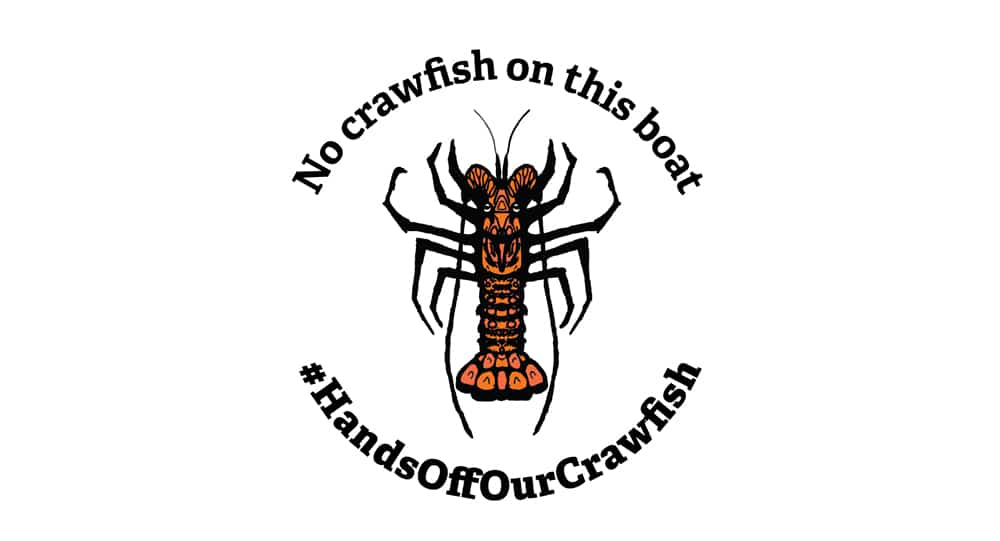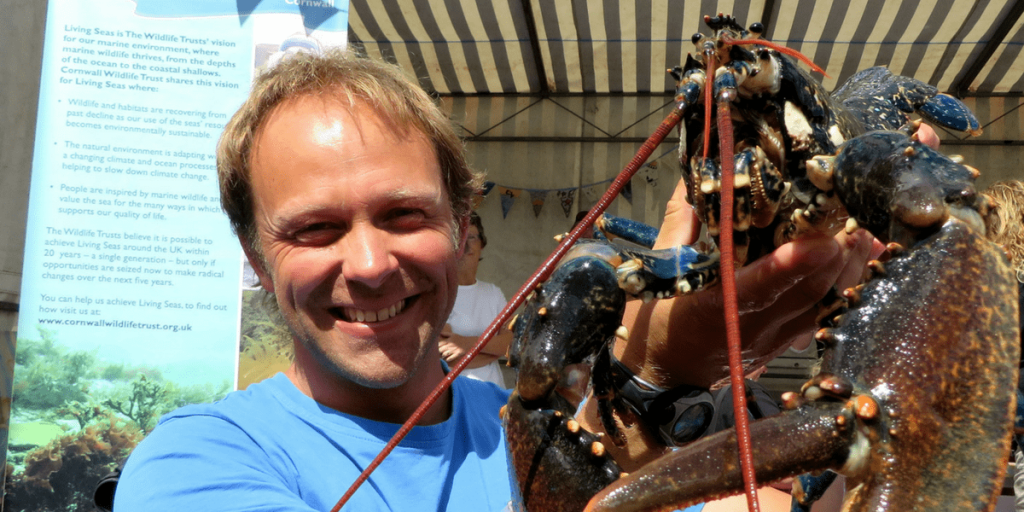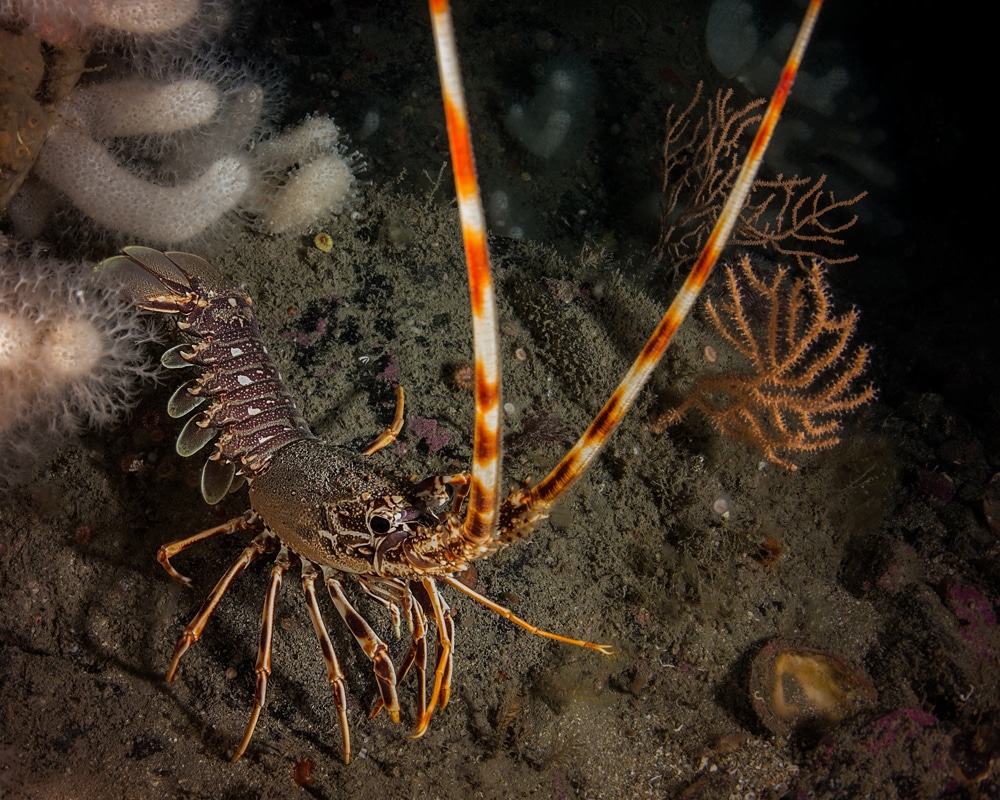Marine Life & Conservation
Divers asked to look after Cornwall’s Crawfish after dramatic comeback

A Cornwall Wildlife Trust initiative introduced by Jeff Goodman
I always thought it was OK to take one for the pot. Diving in the early seventies we hardly ever climbed out of the water without something for our tea. But as the eighties approached I saw less and less marine life as full ‘goody’ bags from divers got bigger and more frequent. I started to feel uneasy about what we were doing to our seas.
Of course commercial fishing and angling have always taken an horrendous toll on marine life but now we as divers were in a position to find and take what was left. There is no finer example to this than the wonderful Crawfish. Along with them the Lobsters and Scallops were equally depleted. Scallops reproduce far quicker than Crawfish and so had a better chance to recover. Lobsters were and are reintroduced by hatcheries in their hundreds of thousands. The Crawfish was ignored and left to simply vanish from the marine ecosystem.
Finally against all the odds, Crawfish are starting to re-appear in Cornish waters and already fishermen and divers are eager to take them.
I spoke with Matt Slater, Marine Awareness Officer for Cornwall Wildlife Trust and as a result he sent me the following article on their new initiative to give these incredible animals a fighting chance. Whether you live in Cornwall or Timbuktu, I urge, no implore you to read this and give it all the support you can.
Matt Slater:
After nearly forty years crawfish have made a dramatic comeback as large numbers of young crawfish have reappeared on wrecks and reefs all around the Cornish shores.
The crawfish or spiny lobster is a spiky and ornate relative of the common lobster, with incredible long antennae and a powerful finned tail. This species was overfished back in the 1970’s and 80’s by both fishermen and divers but in recent years marine conservationists have been thrilled to see their return.
However Cornwall Wildlife Trust is now calling on divers to show that they care about crawfish by pledging not to catch them through a new national campaign called #HandsOffOurCrawfish
They hope through education to get a high proportion of divers supporting this campaign with the eventual aim to see crawfish better protected in our waters, ensuring a sustainable fishery for the species. Dive schools, dive boats and dive clubs will be provided with stickers saying ‘no crawfish on this boat’ and the Trust hopes to provide a much needed clear message for the benefit of these creatures.
Crawfish can live to up to 60 years and are very slow growing. They have long antennae which are used to taste the water to help them look for food as they scavenge on the sea bed.
They also communicate by generating a strange creaking sound by rubbing the bases of their antennae against their shell. This sound can travel for long distances and may play a role in attracting mates.
Matt Slater, Marine Awareness officer for Cornwall Wildlife Trust describes his first encounter with these creatures.
“We dropped down to the seabed on a rocky reef off Newquay that I have dived many times over the years. Where previously I had never seen any crawfish, on this dive within just a few minutes we found 18 beautiful crawfish.”
“Through our Seasearch citizen science project our volunteer divers have recorded huge numbers of crawfish over the past few years in Cornish waters. And we now carry out repeat survey dives for this species at several locations in Cornwall.”
“Divers all around the south west are reporting crawfish at their favourite dive sites and everyone is really pleased to see them back. However, there is a strong concern from many that we must ensure that they are back for good and that fisheries for this species are carried out at sustainable levels to ensure that history does not repeat itself and they become over fished again.”
“The majority of recreational divers appreciate all the marine creatures they encounter and very few collect marine life to eat, preferring to enjoy peaceful encounters and underwater photography. Having said this, many popular dive sites appear to have groups of resident crawfish. If even small numbers of divers start collecting them, it would not take long for them to disappear once again.”
“We already have the support of many of Cornwall’s dive operators and dive schools but we would ask everyone to get involved and to pledge not to take crawfish on their dives – that’s why we started the ‘Hands Off Our Crawfish’ campaign.”
Dive Newquay were the first company to sign up to the campaign. Paddy Maher of Dive Newquay says, “Since we first set up our dive company five years ago we have always made our customers return any collected crawfish back into the sea. No one wants to see these creatures wiped out again as they were in the 1980’s. It makes absolute sense to educate divers and to ask people to think more about their impacts on the underwater world.”
To pledge please visit www.cornwallwildlifetrust.org.uk/crawfishproject Look out for the hash tag #HandsOffOurCrawfish on social media as the Trust hopes divers will share their photos and crawfish news to help spread the word about the project!
This campaign will also be promoted through the national Seasearch programme in Devon, Dorset and the Channel Islands.
Further information
Crawfish or spiny lobster
Palinurus elephas
- These ancient crustaceans are usually found on exposed rocky reefs at depths of at least fifteen meters.
- They are heavily armoured, with sharp spines for defence.
- Unlike lobsters crawfish don’t have large claws instead having spikey front legs.
- Crawfish grow slowly, and can grow to a maximum size of 1 meter living for at least 60 years.
- They take at least three years before they are old enough to breed. Larger females produce far more eggs than smaller ones.
- Crawfish use their spectacular, long antennae to taste tiny amounts of chemicals in water allowing them to detect predators and other mates as well as food.
- Crawfish can communicate using strange creaking sounds that they produce by rubbing the base of their long antennae against each other. This sound can travel for long distances underwater. Some Cornish fishermen actually call crawfish ‘creakers’
Seasearch
- Seasearch is a national citizen science project that trains recreational divers to record marine life and habitats they encounter on their dives.
- The project is led by the Marine Conservation Society and in Cornwall it is coordinated by and funded by Cornwall Wildlife Trust.
Aims of Seasearch
- To encourage the participation of volunteer recreational divers in marine conservation through gathering data, particularly for areas where little data exists or where there is a conservation need,
- To provide training in recording skills to enable volunteer recreational divers to participate in Seasearch,
- To make quality assured Seasearch data available to partner organisations and the general public,
- To raise public awareness of the diversity of marine life and habitats in Britain and Ireland through the dissemination of information gathered and the identification of issues arising from it.
Matt Slater, Marine Awareness Officer CWT

A Cornish Marine biologist and educator, experienced in aquarium and community engagement work. I am passionate about our marine world and love sharing this passion and encouraging us all to take better care for the oceans.
Marine Life & Conservation
Shark Trust launches Oceanic 31 Shark Art Auction

 After a two-year tour of UK art galleries, community spaces and aquariums, the Shark Trust’s acclaimed Oceanic31 exhibition takes its final bow at the Royal Geographical Society later this month. And the unique collection of artwork, depicting 31 species of oceanic sharks and rays, donated by 31 artists, is now open for bids from art lovers and shark enthusiasts. The online auction, launched today, will close on the 7th December at 8pm (BST). The money raised will support the Shark Trust Oceanics Programme.
After a two-year tour of UK art galleries, community spaces and aquariums, the Shark Trust’s acclaimed Oceanic31 exhibition takes its final bow at the Royal Geographical Society later this month. And the unique collection of artwork, depicting 31 species of oceanic sharks and rays, donated by 31 artists, is now open for bids from art lovers and shark enthusiasts. The online auction, launched today, will close on the 7th December at 8pm (BST). The money raised will support the Shark Trust Oceanics Programme.
People can now bid on 27 of the artworks by visiting this website:
https://superstars-auctions.com/sharktrustauction
It is a chance to own a beautiful piece of original art and to support the Shark Trust. The timing of the auction also means that these would make a very special Christmas gift for any shark-lover.
- Bigeye Thresher Shark by Janina Rossiter
- Carcharodon carcharias by Jimmy Higgs
- Croc VR 2030 by Tom Mead
- Oceanic Whitetip by ATM
- Silky Street by ScapaJoe
The diversity of pieces mirrors that of the sharks and rays they represent. You can bid on paintings, digital creations, sculptures, mixed media and more. You can pick your favourite artist or species of shark. Or you can select the perfect artwork to make a statement in your home or office. Whichever you choose, you will be supporting the work to protect these amazing animals.
One of the pieces of art has been selected to be auctioned live by Steve Backshall at the For the Love of Sharks event at the Royal Geographical Society in London on the 29th November. In addition to this, two further pieces will be raffled at this event, giving people a chance to win an incredible piece of shark art. For the Love of Sharks is the Shark Trust’s flagship evening. A night to celebrate sharks. Steve Backshall is the headline speaker at this event that will see other prominent shark advocates join him on stage.
Tickets for the event can be snapped up here:
https://thesharktrust.org.uk/Event/flos24
Those that would like to see the Oceanic 31 exhibition have one final chance. It is being displayed at the Pavilion at the Royal Geographic Society from 26th November until the 7th December. Entry is free.
Find out more here:
https://www.rgs.org/events/upcoming-events/oceanic-31
Paul Cox, Shark Trust CEO, Said “This exhibition has given us the opportunity to reach out to a new audience. And inspire more people with the wonderful sharks and rays on which our Big Shark Pledge campaign is based. We are immensely grateful to the 31 artists who have worked so hard to create these works.”
Bid for your favourite Oceanic 31 artwork here:
https://superstars-auctions.com/sharktrustauction
Banner Image: Smooth Hammerhead by Alicia Hayden
Marine Life & Conservation
Meet Steve Backshall in the Bite-Back Prize Draw

Until 28 November, prizes worth a massive £10,000 – including experiences, products and tuition – feature in a line-up of items that can be won for £5 in an online prize draw to celebrate Bite-Back Shark & Marine Conservation’s 20th anniversary and help generate crucial funds for the future.
Top of the list of prizes is the chance to spend time with adventurer and wildlife expert Steve Backshall, a workout session with Nat Geo star Aldo Kane, a kayaking trip alongside white-water expert and diver Sal Montgomery and a Zoom call with ‘shark whisperer’ Cristina Zenato.
On top of that, some of the most admired companies in the diving and scuba industry have been quick to support the charity with fabulous prizes that make the £5 ticket price worth more than just a flutter.
Master Liveaboards, BSAC, Midlands Diving Chamber, Go Freediving and Blue Shark Snorkel have all generously donated experience prizes, while celebrated photographer Alex Mustard has donated a print and artists Scott Gleed and Olivier Leger have donated a sculpture and illustration to help boost the fundraising pot.
Fourth Element has donated Ocean Positive gear and LA watch company Nodus has gifted the charity a stunning dive watch. For land lovers, the charity has included a five star London hotel stay at Bankside Hotel plus a family visit to Longleat Safari Park in the roster of prizes.
Campaign director for Bite-Back, Graham Buckingham, said: “We’ve been overwhelmed with support from companies and individuals that we truly admire and who have supported us on our 20 year journey and we’re truly grateful to them all. While we feel incredibly proud of our achievements over the past two decades – and we are super excited about the next chapter – this prize draw isn’t a vanity project. It represents a real lifeline to our work and important advancements in the global protection of sharks. So we hope divers, dive clubs and even bargain hunters grab some tickets to make this a massive success.”
The charity hopes that the prize draw will generate crucial funds to launch a brand new, ground-breaking, campaign to enrol the public and increase support for the protection of sharks around the world.
To enter the competition visit www.bite-back.com/prizedraw. The prize winners will be announced on 1 December 2024.
-

 News1 month ago
News1 month agoIconic SS United States to become the World’s Largest Artificial Reef
-

 Blogs3 months ago
Blogs3 months agoNovoScuba’s Game-Changing Approach for Dive Store Owners: WE PAY YOU!
-

 News2 months ago
News2 months agoBook Review – 52 Assignments: Underwater Photography
-

 Gear News2 months ago
Gear News2 months agoDYNAMICNORD – New German diving brand enters the British market
-

 News2 months ago
News2 months agoExploring Cenote El Pit: A Diver’s Dream
-

 Gear News2 months ago
Gear News2 months agoTry BARE drysuits (and maybe even win one!) this Friday with Sea & Sea at North West Dive Fest
-

 News3 months ago
News3 months agoComing Soon – 52 Assignments
-

 News3 months ago
News3 months agoSave £200 per person per week at Pole Pole Lodge with Dive Worldwide




















